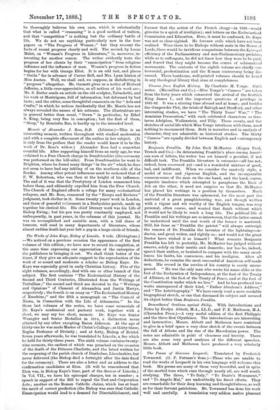CURRENT LITERATURE.
The principal article in the Universal Review for November (Swan Sonnenschein and Co.) is an attempt to answer the Protest against competitive examinations by the statistical method. Mr. Quilter has consulted by circular the whole body of men engaged in education, and finds that of the 24 Head-Masters of important Public Schools in England, 18 have answered him ; and of these, 12 are in favour of competition, 2 refuse to give an opinion, 1 desires further inquiry, and only 3 are opposed to it. Of 122 Public School masters, 115 are in favour of competition ; and of 142 grammar-schools, 114 are against the proposal to abolish it; while in 75 Board schools, the majority on the same side is 39. The figures, of course, prove little, the weight of argument not depending upon numbers ; .but they dispel the idea that there is a general cry for revolutionary change. Of the papers on the same side. which follow, Mr. Wren's is the most readable, not only because it is the best-written, but because
he thoroughly believes his own ease, which is substantially that what is called " cramming " is a good method of tuition, and that " competition " is nothing but the ordinary battle of life. We do not see anything particularly new in the four papers on "The Progress of Woman ;" but they recount the facts of recent progress clearly and well. The second, by Lucas Malet, on "Woman's Progress in Literature," is, moreover, in- teresting for another reason. The writer evidently tests the progress of her clients by their " emancipation " from religious influence and the influence of man. Woman's progress in fiction begins for her with George Eliot. It is an odd test, and places " Ouida" far in advance of Currer Bell, and Mrs. Lynn Linton of Miss Austen. Well, we shall end, we suppose, in disbelieving in "progress" altogether. Mr. Garnett gives us a notice of Richard Jefferies, a little over-appreciative, as all notices of his work are ; Mr. S. Butler sends an article on the old sculptor, Tabachetti, and his work at Montrigone, full of information, but deformed by bad taste; and the editor, some thoughtful comments on the "Arts and Crafts," in which he notices incidentally that Mr. Morris has not always revealed the names of his artisans. The illustrations are in general better than usual, " Dawn " in particular, by Ethel S. King, being very fine in conception ; but the first of them, "Sleep," by Henrietta Rae, is hardly up to the intended level.



















































 Previous page
Previous page